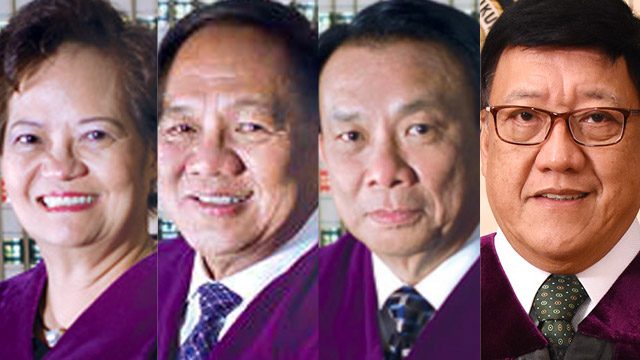SUMMARY
This is AI generated summarization, which may have errors. For context, always refer to the full article.

MANILA, Philippines – A private citizen by the name of Rhia Ceralde filed on Friday, August 24, an opposition to the Judicial and Bar Council (JBC) asking for the disqualification of the 4 chief justice applicants who voted in favor of the quo warranto ouster of Maria Lourdes Sereno.
Ceralde said that Associate Justices Teresita Leonardo de Castro, Diosdado Peralta, Lucas Bersamin, and Andres Reyes Jr do not possess the constitutional requirements of “integrity, probity and independence” because they voted in favor of the quo warranto ouster, slammed by many prominent law groups as an unconstitutional mode of removing a chief justice.
Ceralde cited Section 5, Rule 4 of the JBC’s rules and regulations saying a person who has “pending criminal or regular administrative cases” is “disqualified from being nominated for appointment to any judicial post or as Ombudsman or Deputy Ombudsman.”
Opposition lawmakers filed on August 23 impeachment complaints against 7 justices, including the 4 chief justice applicants, also citing their quo warranto as basis.
“The impeachment complaints filed against Associate Justices De Castro, Bersamin, Peralta and Reyes are tantamount to administrative cases that bar them from being included in the short list to be submitted to the President. They should be disqualified from nomination to the position of chief justice,” said Ceralde.
LOOK: Received copy of the opposition filed at the JBC pic.twitter.com/6T3mvkPw3W
— Lian Buan (@lianbuan) August 24, 2018
Read our #CJSearch stories here:
- How did aspirants vote on key Supreme Court decisions?
- Promised reforms of chief justice applicants
- The PAL flip-flops of Supreme Court Justices Peralta, Bersamin
What do JBC rules say?
However, Rule 4, Section 5(2) of the JBC rules also says “complaints against applicants concerning the merits of cases or ascribing errors to their decisions or resolutions, which are judicial in nature, shall not be grounds for disqualification.”
The quo warranto vote is a prevailing Supreme Court decision, and a judicial one which the JBC says “shall not be grounds for disqualification.”
“In my personal opinion (not necessarily the JBC position), the mere filing of the impeachment complaint, which is neither a criminal case nor an administrative case as understood under the JBC rules, does not affect the nomination of the four SJ justices for the CJ position,” said Justice Secretary Menardo Guevarra, an ex-officio JBC member.
Ceralde compared it to the time that detained senator Leila de Lima was disqualified from the short list of chief justice in 2012 because she had pending disbarment complaints.
“This opposition invokes the very rule promulgated by the JBC. The JBC has famously applied this rule. Six years ago, the JBC disqualified Senator Leila de Lima from the chief justice race due to the disbarment cases filed against her,” said Ceralde.
Previously, the JBC showed some consideration to this rule. For example, in the case of Ombudsman applicant Labor Secretary Silvestre Bello III, the JBC did not automatically disqualify him because they took into consideration the possibility of his case nearing resolution by the time of deliberations.
The case against Bello was dismissed just in time for the JBC interviews. Ombudsman Samuel Martires was, however, ultimately appointed.
The JBC was set to meet Friday morning to resume deliberations, and possibly vote on the short list for chief justice. It was postponed for a week because the members needed more time to scrutinize the submitted documents of applicants, including their Statements of Assets, Liabilities, and Net Worth (SALNs). – Rappler.com
Add a comment
How does this make you feel?
There are no comments yet. Add your comment to start the conversation.